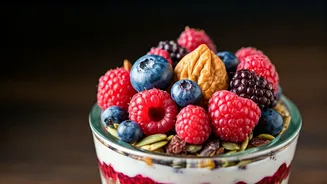Understanding Gut Health
Gut health is essential to overall health. It greatly influences how your body digests food and absorbs nutrients. Maintaining a balanced gut microbiome,
consisting of diverse microorganisms, is key to preventing digestive issues, strengthening the immune system, and improving mental well-being. A diet high in added sugars can disrupt this balance, fostering inflammation and potentially leading to various health problems. Choosing desserts with less sugar is one way to support gut health. This can prevent blood sugar spikes and feed the beneficial bacteria in your gut. These low-sugar desserts allow you to enjoy sweets without compromising your health.
Fructose-Friendly Options
Fruits such as berries, which are naturally lower in fructose, are excellent choices. Blueberries and raspberries can be used as toppings or blended into smoothies, offering sweetness with added fiber and antioxidants. Avocados can be mashed and mixed with cocoa powder and a natural sweetener like stevia. This creates a creamy chocolate pudding with healthy fats. Incorporating these ingredients in your desserts helps reduce the overall sugar load while providing nutrients that support a healthy gut. The combination of fruit and healthy fats ensures that desserts satisfy without causing blood sugar crashes, making them a great choice for long-term health.
Dairy-Free Delights
For those with lactose sensitivities, dairy-free alternatives are recommended. Coconut yogurt is naturally lower in sugar than some other yogurts, providing probiotics that benefit gut health. Coconut-based ice cream is also an option, offering a creamy texture without the added lactose. Making desserts using almond milk or cashew milk provides a creamy base for puddings and mousses. Adding some cinnamon or a touch of vanilla can enhance flavor without significantly increasing sugar. By opting for dairy-free ingredients, you can reduce bloating and inflammation and still enjoy delicious treats that align with your gut health goals.
Sweeteners to Use
Choosing the right sweeteners is important for a gut-friendly dessert. Stevia is a natural, zero-calorie sweetener derived from a plant, and it is a popular choice. Erythritol, another sugar alcohol, is also a suitable option as it has minimal impact on blood sugar levels. Monk fruit extract is another natural option and does not affect blood sugar. Avoid artificial sweeteners and excessive amounts of honey or maple syrup. These can sometimes cause gut irritation due to high fructose levels or unnatural chemical compositions. Experimenting with different sweeteners can help you find flavors that best fit your taste.
Dark Chocolate Perks
Dark chocolate with a high cocoa content (70% or more) can be a good option. Dark chocolate contains antioxidants, which can help reduce inflammation, and can also promote healthy bacteria in your gut. Choose brands with minimal added sugar. To make it more appealing, combine dark chocolate with nuts or a small amount of fruit. This adds flavor and texture while keeping the sugar content under control. A small piece of dark chocolate can satisfy a craving for something sweet without causing the blood sugar spikes associated with sugary desserts.
Nutty & Seed Treats
Nuts and seeds, rich in healthy fats and fiber, can be added to desserts to improve nutritional value. Make energy balls with dates (in moderation), nuts, and seeds. Sprinkle chia seeds or flax seeds into puddings for added fiber and omega-3 fatty acids, which are beneficial for gut health. Incorporating nuts and seeds into desserts not only increases nutritional value but also keeps you full longer, reducing the likelihood of overeating. The combination of fiber and healthy fats helps stabilize blood sugar levels and supports healthy digestion.
Portion Control Importance
Regardless of the ingredients, portion control is crucial. Even low-sugar desserts should be consumed in moderation. Large portions can still lead to excess calories and potentially upset the gut. Plan your meals and snacks in advance and measure out portions to maintain balanced consumption. Eating slowly and savoring each bite can also help you feel satisfied with less food. By focusing on mindful eating and controlling portions, you can find a balance between enjoying delicious desserts and supporting your overall health and well-being.
Recipes and Ideas
Experimenting with recipes is a great way to discover new desserts. Blend frozen berries with a bit of water and stevia for a quick smoothie. Make avocado chocolate mousse by blending avocado, cocoa powder, and stevia. Create chia seed pudding by soaking chia seeds in almond milk and adding vanilla extract and a few berries. Making your own desserts ensures you know exactly what ingredients you are consuming. These quick and easy recipes are tailored to ensure that you can stay on track with your gut health goals while also enjoying the foods that you crave.
Fiber-Rich Additions
Adding fiber-rich ingredients such as oats, flax seeds, or chia seeds, is a good idea. Oatmeal cookies sweetened with a touch of stevia or a small amount of fruit can be a good choice. Fiber helps with digestion and keeps you full. Chia seeds and flax seeds can be sprinkled into puddings or smoothies to improve texture and provide additional nutrients. Fiber supports the gut microbiome, which promotes healthy digestion and reduces inflammation. Including fiber in your desserts helps to balance the impact of any sugars consumed, making them a more beneficial part of your diet.
Mindful Enjoyment Matters
Eating desserts mindfully is just as important as the ingredients. Pay attention to your body's signals and stop eating when you feel satisfied, not stuffed. Savor each bite and focus on the flavors and textures of the food. Avoid distractions while eating, such as watching TV or working, as this can lead to overeating. Creating a peaceful eating environment and appreciating your food can improve digestion and make you feel more connected to your body. Enjoying desserts with mindfulness enhances the entire experience.













